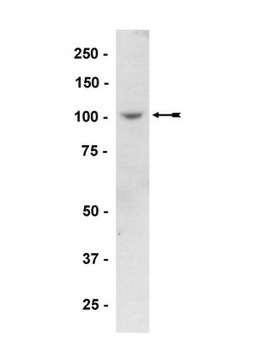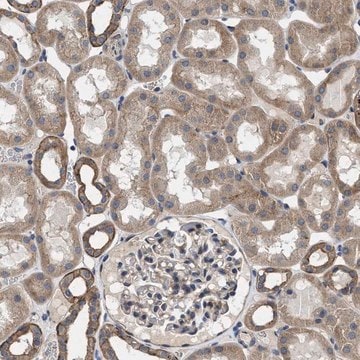ST1042
Anti-PKD2 Rabbit pAb
liquid, Calbiochem®
Szinonimák:
Anti-Protein Kinase D2
About This Item
Javasolt termékek
biológiai forrás
rabbit
Minőségi szint
antitest forma
affinity isolated antibody
antitest terméktípus
primary antibodies
klón
polyclonal
form
liquid
tartalmaz
≤0.1% sodium azide as preservative
faj reaktivitás
human
gyártó/kereskedő neve
Calbiochem®
tárolási körülmény
OK to freeze
izotípus
IgG
kiszállítva
wet ice
tárolási hőmérséklet
2-8°C
célzott transzláció utáni módosítás
unmodified
Géninformáció
human ... PKD2(5311)
Általános leírás
Immunogen
Alkalmazás

Immunoblotting (1:500-1:5000)
Immunoprecipitation (1-4 g/mg lysate)
Kiszerelés
Figyelmeztetés
Fizikai forma
Feloldás
Analízis megjegyzés
HEK 293 cells
Egyéb megjegyzések
Sturany, S., et al. 2002. J. Biol. Chem.277, 29431.
Sturany, S., et al. 2001. J. Biol. Chem.276, 3310.
Jogi információk
Nem találja a megfelelő terméket?
Próbálja ki a Termékválasztó eszköz. eszközt
Tárolási osztály kódja
12 - Non Combustible Liquids
WGK
nwg
Lobbanási pont (F)
Not applicable
Lobbanási pont (C)
Not applicable
Analitikai tanúsítványok (COA)
Analitikai tanúsítványok (COA) keresése a termék sarzs-/tételszámának megadásával. A sarzs- és tételszámok a termék címkéjén találhatók, a „Lot” vagy „Batch” szavak után.
Már rendelkezik ezzel a termékkel?
Az Ön által nemrégiben megvásárolt termékekre vonatkozó dokumentumokat a Dokumentumtárban találja.
Tudóscsoportunk valamennyi kutatási területen rendelkezik tapasztalattal, beleértve az élettudományt, az anyagtudományt, a kémiai szintézist, a kromatográfiát, az analitikát és még sok más területet.
Lépjen kapcsolatba a szaktanácsadással








